Listen:
Check out all episodes on the My Favorite Mistake main page.
My guest for Episode #304 of the My Favorite Mistake podcast is Dr. Tia Warrick, a clinical research leader, epidemiologist, author, and entrepreneur who has spent nearly a decade working in the pharmaceutical and biotech industries.
She’s the founder of Lesous Consulting, a firm dedicated to supporting clinical research professionals and organizations through education, business analytics, and strategic consulting. With a strong academic background—including a doctorate in health science and clinical health education—Dr. Warrick is committed to empowering the next generation of researchers and bringing more awareness to the vast career opportunities within clinical research.
In this episode, Dr. Warrick shares her “favorite mistake”—not speaking up for herself early in her career. She candidly reflects on a time when she took on significantly more responsibilities than her job description called for but hesitated to advocate for a promotion or raise. Her story highlights how staying silent led to missed opportunities and feelings of frustration. But more importantly, she explains how learning to take accountability and find her voice ultimately fueled her confidence, career progression, and entrepreneurial path.
We also explore the broader challenges and opportunities within the clinical research industry, especially for early-career professionals who may not realize the variety of roles available. Dr. Warrick discusses the importance of mentorship, the need for greater visibility into clinical research career paths, and her motivation for writing Burst the Bubble, a book designed to inform and inspire future talent in the pharmaceutical world. She also touches on how she now teaches others to confidently advocate for themselves—whether during salary negotiations or while shaping their career direction.
Questions and Topics:
- What’s your favorite mistake, and what did you learn from it?
- Was your early role as a clinical research coordinator before or after your advanced degrees?
- When did you realize you should have spoken up for yourself sooner?
- Was there a mentor or moment that helped you come to that realization?
- After receiving a small raise, did you try to advocate for more or take another path?
- Do you share this lesson with students or early-career professionals you mentor?
- How do you coach others on negotiating compensation and advocating for themselves?
- Why is it especially important to speak up early in your career?
- What are some misconceptions people have about roles in clinical research?
- How do you raise awareness about the breadth of opportunities in the field?
- How strong is the job outlook in clinical research, and how might AI impact it?
- What was the inspiration behind founding Lesous Consulting?
- What leadership lessons have you learned so far as a new entrepreneur?
- How do you create a culture where people feel safe to speak up and share feedback?
- What does psychological safety look like in your company and classroom?
- Can you tell us about the AI platform you’re developing and how it supports clinical research?
Scroll down to find:
- Video version of the episode
- How to subscribe
- Quotes
- Full transcript
Find Dr. Warrick on social media:
Video of the Episode:
Quotes:
Click on an image for a larger view
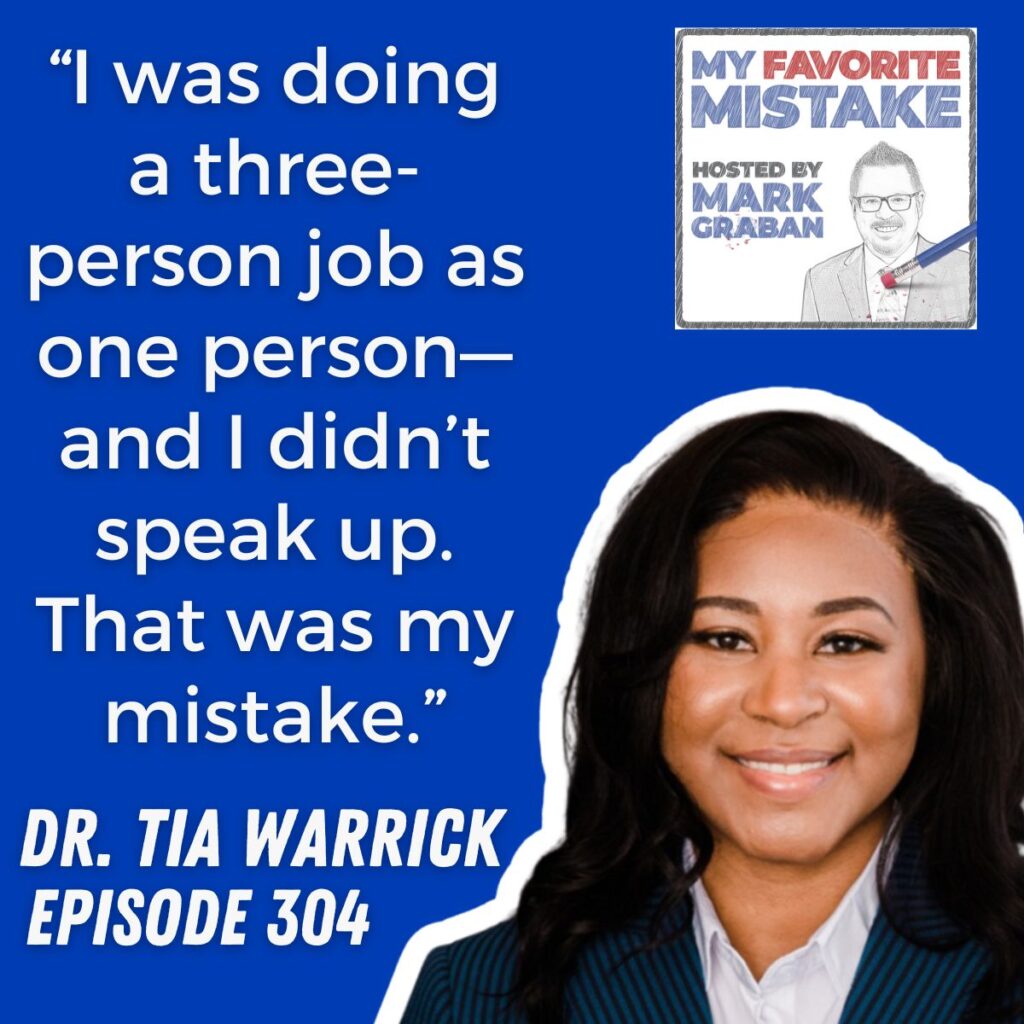
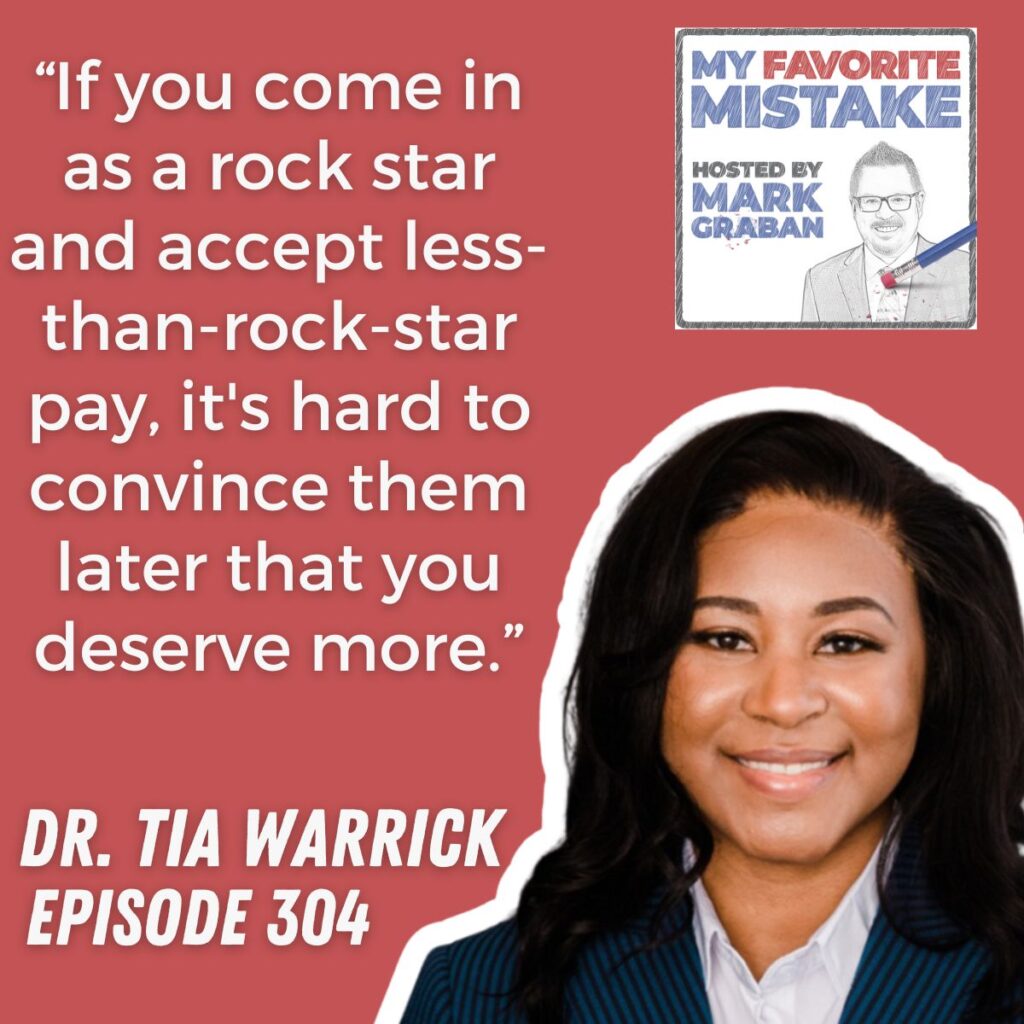
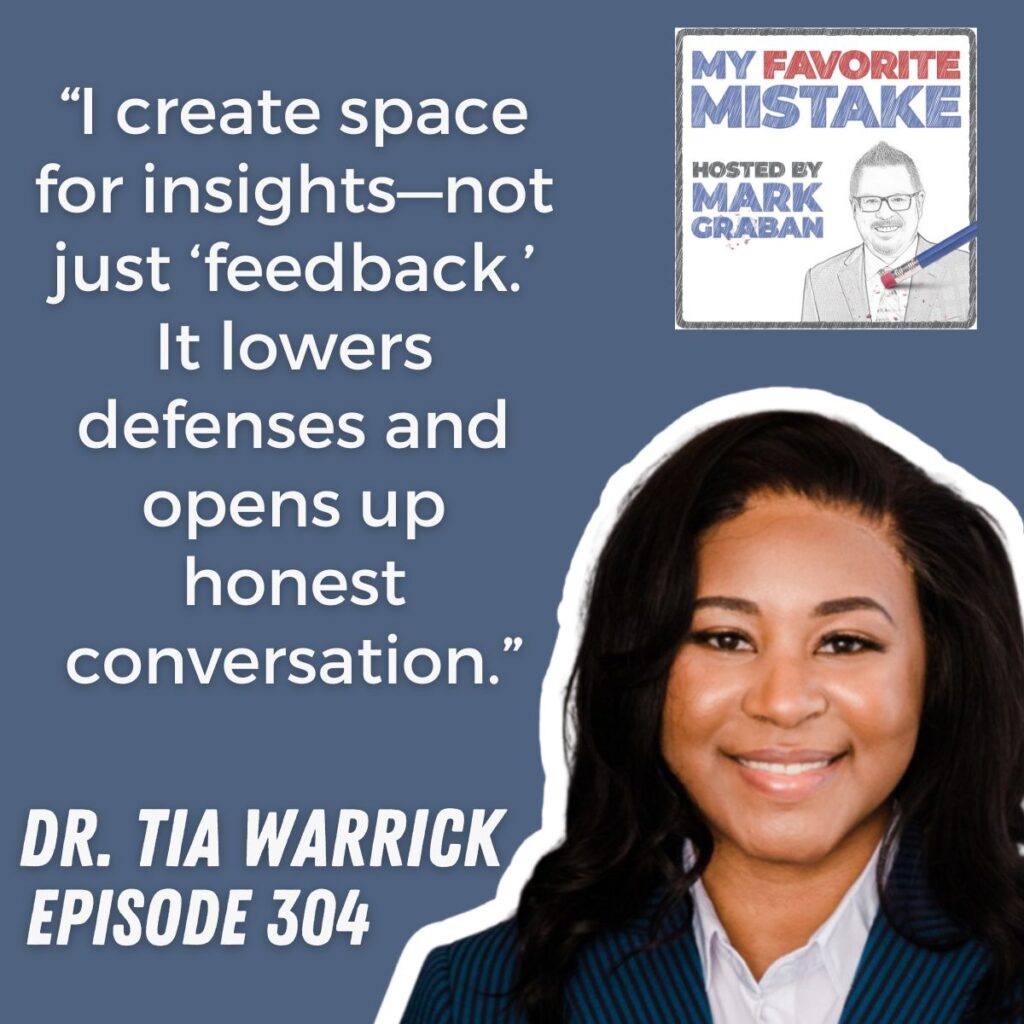
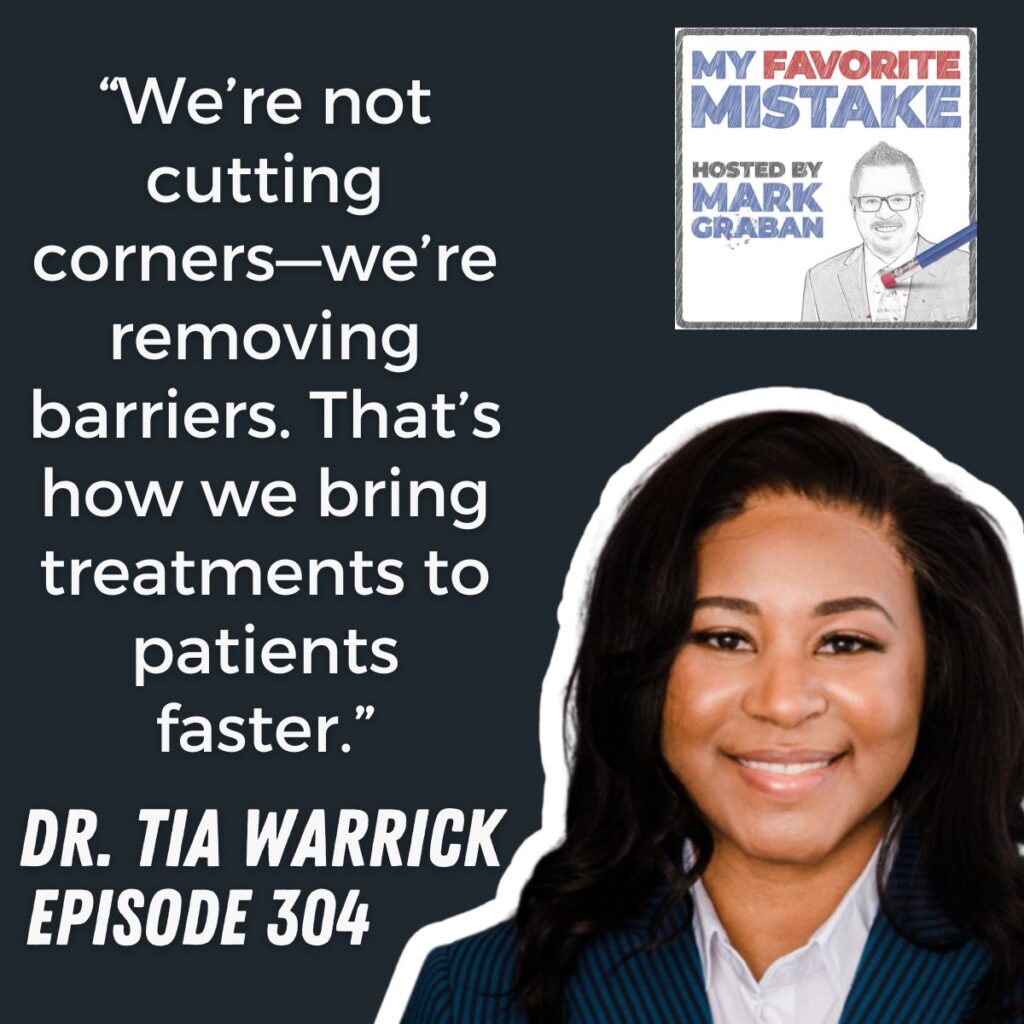
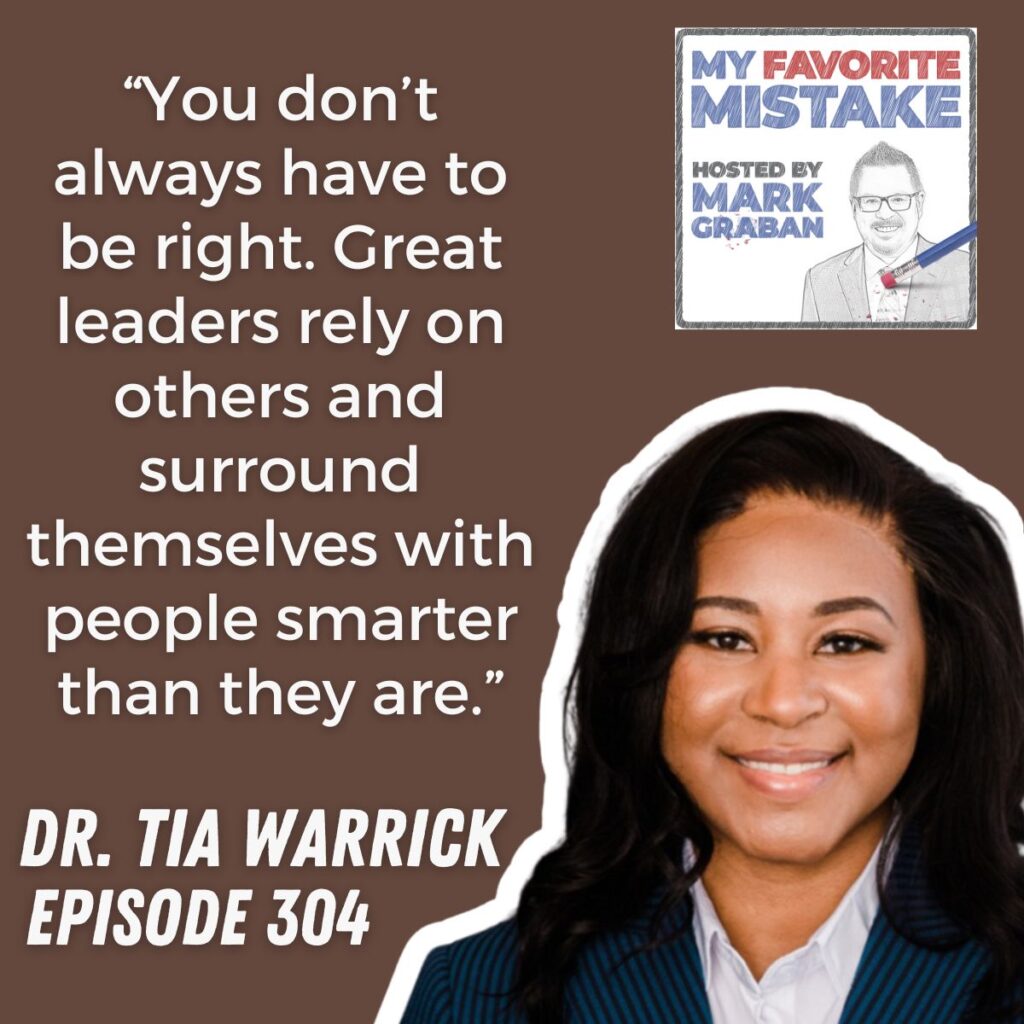
Subscribe, Follow, Support, Rate, and Review!
Please follow, rate, and review via Apple Podcasts, Podchaser, or your favorite app — that helps others find this content, and you'll be sure to get future episodes as they are released weekly. You can also financially support the show through Spotify.
You can now sign up to get new episodes via email, to make sure you don't miss an episode.
This podcast is part of the Lean Communicators network.

Other Ways to Subscribe or Follow — Apps & Email
Automated Transcript (May Contain Mistakes)
Mark Graban:
Hi. Welcome to My Favorite Mistake. I'm your host, Mark Graban. Our guest today is Dr. Tia Warrick.
She is a distinguished clinical research professional, an epidemiologist, and a professor with nearly a decade of experience in the pharmaceutical industry. In 2023, she founded Lesous Consulting, a firm dedicated to empowering clinical research professionals and organizations through strategic education, business analytics, and consulting services. So before I tell you more about her—welcome to the show, Dr. Warrick. How are you?
Dr. Tia Warrick:
Thank you. Thank you for that warm welcome. I'm doing pretty great today. How are you doing?
Mark Graban:
Good. Happy to have you here. I think we're going to have a great discussion. Let me share a little bit more about our guest. Her academic credentials include a Bachelor of Science in Biology, a Master of Public Health with a focus on epidemiology, and a Doctorate in Health Science and Clinical Health Education. She's led numerous clinical trials specializing in study design and statistical analysis and is recognized for her commitment to mentoring the next generation of researchers.
As an accomplished author, Dr. Warrick has written the award-winning book Burst the Bubble: A Look into Careers in the Pharmaceutical Industry, which offers insights into career opportunities and entrepreneurial pathways. I think we’ll be able to talk about that later in the episode. But first things first—as we do here—what's your favorite mistake?
Dr. Tia Warrick:
Thank you so much for that introduction. To jump right into it, my favorite mistake was honestly not speaking up for myself. I always waited for opportunities to arise before I would say something, but I never took accountability to create those opportunities for myself.
When I first started in clinical research, I was in a very entry-level position as a coordinator. I worked really hard and kept my head down, which is important in any job—but what I failed to do was speak up when it came time to seek promotions or new opportunities. A lot of time passed, and those chances slipped by. I became complacent.
It took time, but I eventually realized I needed to take accountability. I should have spoken up sooner—whether asking for a raise or seeking a new position. Learning from that mistake made me stronger and helped me become the person I am today.
Mark Graban:
Yeah. I appreciate you sharing that. I'm glad there's that recognition, as you said, that you’re better off for it now. Just for context, when you were working as a coordinator, was that after you had finished your bachelor’s degree, before your advanced degrees, or after your doctorate?
Dr. Tia Warrick:
Great question. That was actually in between—I was in my master’s program at the time. It was a weird period. I didn’t have my MPH yet, but I had my bachelor’s. And for a clinical research coordinator, a bachelor’s isn’t even always required. So technically, I was overqualified. I accepted the job knowing the pay wouldn’t be much, but also thinking the responsibilities wouldn’t be a lot either.
But that changed. My responsibilities grew significantly beyond the job description—yet my pay stayed the same. I noticed it, but I didn’t speak up. I thought, “If I keep my head down and do the work, they'll recognize it.” And while they did, it wasn’t in the way I needed. That was on me. I should have advocated for myself.
Mark Graban:
Was there a particular spark or moment of recognition where you realized that mistake? Did a mentor point it out, or did you come to that conclusion on your own?
Dr. Tia Warrick:
It was kind of a mix. I was attending sponsor dinners, meeting with high-level VPs, and helping oversee budgets. They were praising me for how well I was performing. That made me pause and realize—I was doing a three-person job as one person.
Then, I got my raise letter in the mail. It was for $0.25. That really hit me. I thought patience would be rewarded, but that wasn’t the case.
Mark Graban:
Did you advocate for yourself after receiving that letter, or was it more of a turning point for the future?
Dr. Tia Warrick:
I did try to advocate, but it felt too late. They said they couldn’t offer more, and I had already outgrown the role. So I handed in my resignation and moved into industry—working with a CRO (Contract Research Organization). That leap was terrifying but also exhilarating. If I hadn’t made that earlier mistake, I might not have made that leap.
Mark Graban:
Now that you mentor others, do you proactively share this lesson about speaking up?
Dr. Tia Warrick:
Absolutely. Many people struggle with advocating for themselves—especially during salary negotiations. I remind them: if you've made it to the final round, they see you as valuable. Ask for what you’re worth. The worst they can say is “no.”
Mark Graban:
And not speaking up early in your career can have a compounding effect, right?
Dr. Tia Warrick:
Exactly. If you come in as a rock star but accept less-than-rock-star pay, it's hard to justify more later. Advocate for yourself from the start. I try to help my students build that confidence, refine their resumes, and define their five-year goals.
Mark Graban:
Is it difficult to attract talent into clinical research compared to other science-based careers?
Dr. Tia Warrick:
It is. Many students think doctor, nurse, or lawyer. They’re unaware of the thousands of roles in clinical research. There’s a place for everyone—whether your background is in business, biology, or IT. That’s why I wrote Burst the Bubble, to raise awareness.
Mark Graban:
What’s the job outlook in clinical research, especially with AI on the rise?
Dr. Tia Warrick:
The outlook is great. AI is being used as a support tool, not a replacement. We still need medical writers, safety specialists, data analysts, and coordinators. AI isn’t ready to take over critical responsibilities. Growth is expected—particularly for clinical research coordinators.
Mark Graban:
Let’s talk about Lesous Consulting. What inspired you to start your own company?
Dr. Tia Warrick:
I moved quickly through the CRO world—rising from entry-level to Global Senior Project Manager in less than a year. But I hit a ceiling. I wanted to grow in depth, not just climb. I also saw industry-wide gaps that I wanted to help solve. So I founded Lesous Consulting to educate, empower, and create lasting impact.
Mark Graban:
What have you learned so far as an early-stage entrepreneur?
Dr. Tia Warrick:
One big lesson: you don’t always have to be right. Great leaders rely on others and surround themselves with people smarter than they are. I’ve learned to listen more and focus on learning, not proving myself.
Mark Graban:
How do you ensure your employees and students feel safe speaking up?
Dr. Tia Warrick:
I model that behavior. I carve out time in meetings to ask for honest thoughts. I avoid the phrase “critical feedback”—I ask for “insights.” That lowers defenses. I want people to feel heard and know their voice matters.
Mark Graban:
That’s such an important distinction. Asking for advice instead of “feedback” can be more inviting.
Dr. Tia Warrick:
Exactly. When you remove ego from the equation, you open space for honest dialogue and growth.
Mark Graban:
Let’s shift to technology. You’re developing an AI platform as part of Lesous Consulting. What’s its focus?
Dr. Tia Warrick:
It’s called Lesous. It’s designed to support—not replace—clinical trial professionals. The goal is to reduce the massive administrative delays that cause 80% of trials to fail. For example, budgets can take 3–4 months to build. Our tool helps automate that in two weeks. That time savings can literally save lives.
Mark Graban:
That’s powerful. Cutting waste in the process while still protecting safety and quality.
Dr. Tia Warrick:
Exactly. We’re not cutting corners—we’re removing barriers. And that means more accessible, affordable treatments for patients.
Mark Graban:
That’s a fantastic mission. Dr. Tia Warrick, thank you again for sharing your favorite mistake, your insights on leadership, and your inspiring work in clinical research.
Dr. Tia Warrick:
Thank you so much. It’s been a pleasure.

